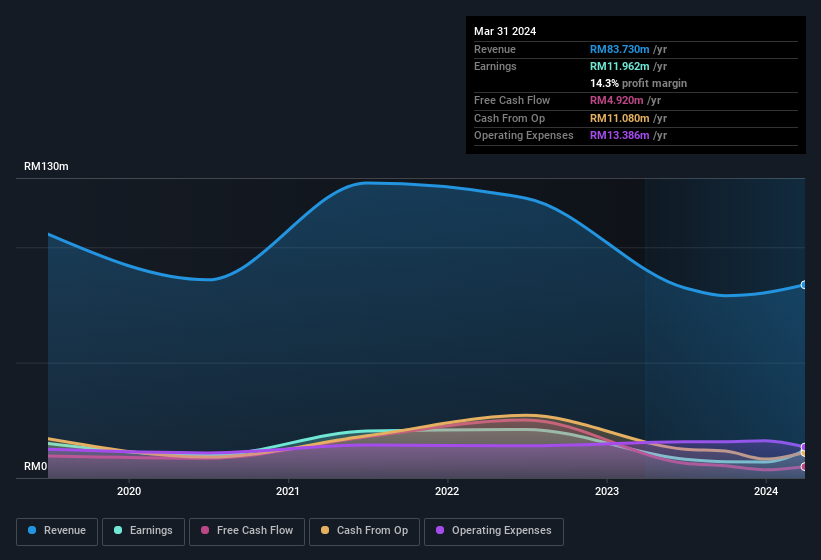We Think You Should Be Aware Of Some Concerning Factors In DS Sigma Holdings Berhad's (KLSE:DSS) Earnings
The market for DS Sigma Holdings Berhad's (KLSE:DSS) stock was strong after it released a healthy earnings report last week. However, we think that shareholders should be cautious as we found some worrying factors underlying the profit.
Check out our latest analysis for DS Sigma Holdings Berhad

Examining Cashflow Against DS Sigma Holdings Berhad's Earnings
As finance nerds would already know, the accrual ratio from cashflow is a key measure for assessing how well a company's free cash flow (FCF) matches its profit. To get the accrual ratio we first subtract FCF from profit for a period, and then divide that number by the average operating assets for the period. This ratio tells us how much of a company's profit is not backed by free cashflow.
That means a negative accrual ratio is a good thing, because it shows that the company is bringing in more free cash flow than its profit would suggest. While it's not a problem to have a positive accrual ratio, indicating a certain level of non-cash profits, a high accrual ratio is arguably a bad thing, because it indicates paper profits are not matched by cash flow. Notably, there is some academic evidence that suggests that a high accrual ratio is a bad sign for near-term profits, generally speaking.
DS Sigma Holdings Berhad has an accrual ratio of 0.21 for the year to March 2024. Therefore, we know that it's free cashflow was significantly lower than its statutory profit, which is hardly a good thing. To wit, it produced free cash flow of RM4.9m during the period, falling well short of its reported profit of RM12.0m. DS Sigma Holdings Berhad shareholders will no doubt be hoping that its free cash flow bounces back next year, since it was down over the last twelve months.
Note: we always recommend investors check balance sheet strength. Click here to be taken to our balance sheet analysis of DS Sigma Holdings Berhad.
Our Take On DS Sigma Holdings Berhad's Profit Performance
DS Sigma Holdings Berhad's accrual ratio for the last twelve months signifies cash conversion is less than ideal, which is a negative when it comes to our view of its earnings. Therefore, it seems possible to us that DS Sigma Holdings Berhad's true underlying earnings power is actually less than its statutory profit. Sadly, its EPS was down over the last twelve months. The goal of this article has been to assess how well we can rely on the statutory earnings to reflect the company's potential, but there is plenty more to consider. With this in mind, we wouldn't consider investing in a stock unless we had a thorough understanding of the risks. Case in point: We've spotted 4 warning signs for DS Sigma Holdings Berhad you should be mindful of and 2 of them don't sit too well with us.
Today we've zoomed in on a single data point to better understand the nature of DS Sigma Holdings Berhad's profit. But there are plenty of other ways to inform your opinion of a company. For example, many people consider a high return on equity as an indication of favorable business economics, while others like to 'follow the money' and search out stocks that insiders are buying. So you may wish to see this free collection of companies boasting high return on equity, or this list of stocks with high insider ownership.
New: Manage All Your Stock Portfolios in One Place
We've created the ultimate portfolio companion for stock investors, and it's free.
• Connect an unlimited number of Portfolios and see your total in one currency
• Be alerted to new Warning Signs or Risks via email or mobile
• Track the Fair Value of your stocks
Have feedback on this article? Concerned about the content? Get in touch with us directly. Alternatively, email editorial-team (at) simplywallst.com.
This article by Simply Wall St is general in nature. We provide commentary based on historical data and analyst forecasts only using an unbiased methodology and our articles are not intended to be financial advice. It does not constitute a recommendation to buy or sell any stock, and does not take account of your objectives, or your financial situation. We aim to bring you long-term focused analysis driven by fundamental data. Note that our analysis may not factor in the latest price-sensitive company announcements or qualitative material. Simply Wall St has no position in any stocks mentioned.
About KLSE:DSS
DS Sigma Holdings Berhad
An investment holding company, engages in manufacturing, supplying, and trading of packaging materials and paper products in Malaysia.
Flawless balance sheet and good value.
Similar Companies
Market Insights
Community Narratives



